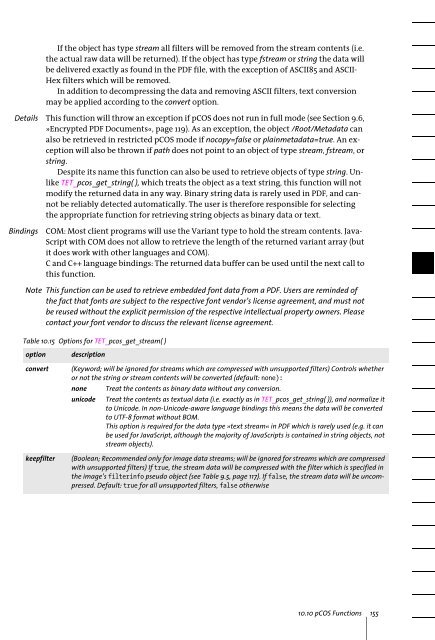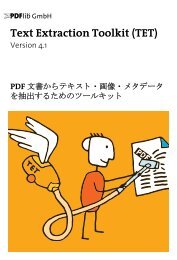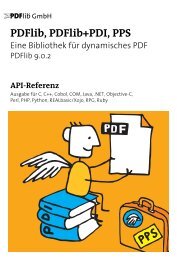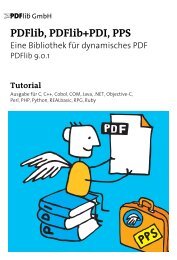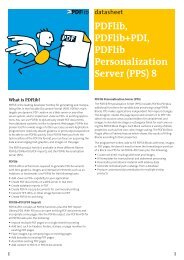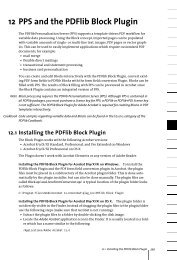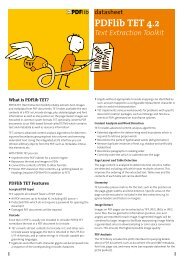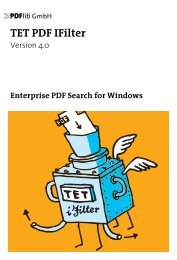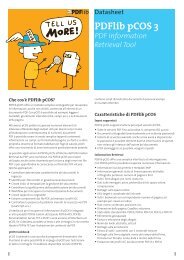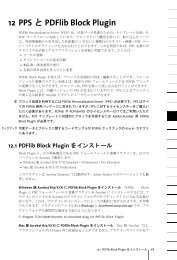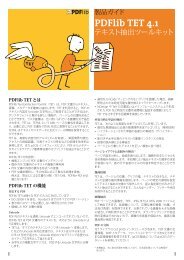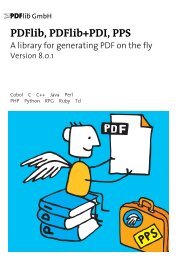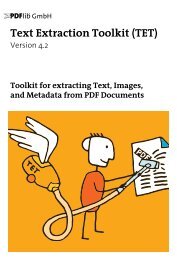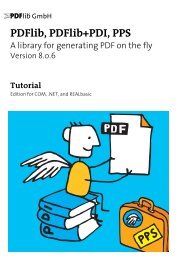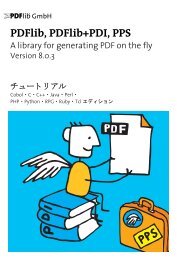PDFlib Text Extraction Toolkit (TET) Manual
PDFlib Text Extraction Toolkit (TET) Manual
PDFlib Text Extraction Toolkit (TET) Manual
You also want an ePaper? Increase the reach of your titles
YUMPU automatically turns print PDFs into web optimized ePapers that Google loves.
If the object has type stream all filters will be removed from the stream contents (i.e.<br />
the actual raw data will be returned). If the object has type fstream or string the data will<br />
be delivered exactly as found in the PDF file, with the exception of ASCII85 and ASCII-<br />
Hex filters which will be removed.<br />
In addition to decompressing the data and removing ASCII filters, text conversion<br />
may be applied according to the convert option.<br />
Details This function will throw an exception if pCOS does not run in full mode (see Section 9.6,<br />
»Encrypted PDF Documents«, page 119). As an exception, the object /Root/Metadata can<br />
also be retrieved in restricted pCOS mode if nocopy=false or plainmetadata=true. An exception<br />
will also be thrown if path does not point to an object of type stream, fstream, or<br />
string.<br />
Despite its name this function can also be used to retrieve objects of type string. Unlike<br />
<strong>TET</strong>_pcos_get_string( ), which treats the object as a text string, this function will not<br />
modify the returned data in any way. Binary string data is rarely used in PDF, and cannot<br />
be reliably detected automatically. The user is therefore responsible for selecting<br />
the appropriate function for retrieving string objects as binary data or text.<br />
Bindings<br />
COM: Most client programs will use the Variant type to hold the stream contents. Java-<br />
Script with COM does not allow to retrieve the length of the returned variant array (but<br />
it does work with other languages and COM).<br />
C and C++ language bindings: The returned data buffer can be used until the next call to<br />
this function.<br />
Note This function can be used to retrieve embedded font data from a PDF. Users are reminded of<br />
the fact that fonts are subject to the respective font vendor’s license agreement, and must not<br />
be reused without the explicit permission of the respective intellectual property owners. Please<br />
contact your font vendor to discuss the relevant license agreement.<br />
Table 10.15 Options for <strong>TET</strong>_pcos_get_stream( )<br />
option<br />
convert<br />
keepfilter<br />
description<br />
(Keyword; will be ignored for streams which are compressed with unsupported filters) Controls whether<br />
or not the string or stream contents will be converted (default: none):<br />
none Treat the contents as binary data without any conversion.<br />
unicode<br />
Treat the contents as textual data (i.e. exactly as in <strong>TET</strong>_pcos_get_string( )), and normalize it<br />
to Unicode. In non-Unicode-aware language bindings this means the data will be converted<br />
to UTF-8 format without BOM.<br />
This option is required for the data type »text stream« in PDF which is rarely used (e.g. it can<br />
be used for JavaScript, although the majority of JavaScripts is contained in string objects, not<br />
stream objects).<br />
(Boolean; Recommended only for image data streams; will be ignored for streams which are compressed<br />
with unsupported filters) If true, the stream data will be compressed with the filter which is specified in<br />
the image’s filterinfo pseudo object (see Table 9.5, page 117). If false, the stream data will be uncompressed.<br />
Default: true for all unsupported filters, false otherwise<br />
10.10 pCOS Functions 155


